The young man who taught Prince George that gay people can be open in our city and cross-dressing is an art form is now teaching about the long road to recovery.
Travis Shaw has been the city's most outspoken gay equality advocate and, as Foxy De-Roxy, one of B.C.'s most acclaimed drag queens. He was taken off the stage by a brain tumor and for the first time is speaking publicly about the chill of the diagnosis and the thrill of the comeback.
"When I was filling out forms at the cancer clinic desk, a woman - she was obviously quite sick - went off on me because 'this place is for sick people, what are you doing in here?' and a bunch of hostile stuff, so I told her that I didn't look ill but I had a brain tumor and needed surgery," Shaw said. "I've never looked drib-drab in my entire life and I'm not going to start just because of this. I wore diamonds and chains and nice clothes all along. Even right now I can't do a lot but I'm slowly getting back into a glamorous life. My goal is to get back on the stage because a doctor in Vancouver told me I couldn't do shows ever again. I told him I was going to do even bigger shows, now, I don't listen to that 'no' word. If I did I wouldn't have amounted to anything."
While most cancer recovery patients are insulated from stress and negative influences, in order to boost the spirit through the critical healing period, that was not the case for Shaw.
"I receive hate mail," he said. "I get messages saying 'why do you parade around?' and 'why are you so out there?' and why do you dress like a girl' and I'm just giving you the nice version. But hate messages come with the territory."
Shaw also received plenty of positive support - even supermodel/actor Naomi Campbell sent a personal message.
"My family was fiercely protective of me. They all stepped up and took charge so all I had to do was recover," Shaw said. "And I was surprised by all the support that came flooding in from friends, fans, people I didn't expect. I didn't hide my illness from the people close to me but I also didn't advertise it. It basically made me cry, the outpouring of love and caring - the things people said and sincerely meant. When you are so public, you have a blurred view of reality, and 90 per cent of what you're told is negative. This was the opposite and it was insane. To suddenly have that rush of support is amazing."
Nothing else about this medical situation has been a rush, though. It has been a marathon of tests, a delicate surgery, and a long and exhausting recovery.
The issue first came up after unrelated ear surgery. After that relatively minor procedure in 2012 he experienced blurred vision, headaches, and localized pain that puzzled the doctors. Eventually it reached alarming levels and brain scans were ordered.
What they found was a mysterious mass directly behind his right ear. It extended about halfway up the interior of his skull and down into his neck. It was intertwined with the complex of nerves that cluster in that region before branching off all over the face and head. It was also impeding the blood flow through his carotid artery.
The good news was it was a neurofibromas brain tumor - not aggressive. Doctors were confident that trimming away the pressure-points (this required the dislocation of his jaw and the removal of a small piece of facial bone in addition to the crescent incision behind his ear) would take care of the main problems.
That surgery was done on July 4. No more surgeries are anticipated, but regular scans will go on for years to monitor the mass.
Shaw had to deal with a cluster of side-effects. His forearms feel like playdough from all the intravenous medications. At worst, he had 11 pills per day to ingest. His weight swelled from about 135 pounds to 220 pounds on his 6-foot-1 frame. He was so sapped of energy he spent most of every day laying down.
Now his weight is back to about 150, he is working again at a Prince George coffee shop, and he is socializing again.
"I had a bunch of friends fag-nap me, just to make me get outside," he said. "They would make sure I got to sit in a park or go for a drive. They were fighting harder for me than I was, but it turned things around for me."
His greatest fear, while waking up from the surgery sedatives, was "that something happened in there that would change who I was, but no, the effects I have just made my new routine, my new normal, and I am still the same person. And I was given an amazing gift. How many people get to know the world is standing beside you, praying for you, taking time out of their lives to offer you support? I haven't been dressed up [in drag] for over a year, but I will do shows again, I know that now. I have had a learning experience - I am finding out how strong I am."



